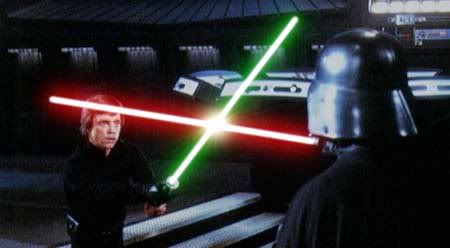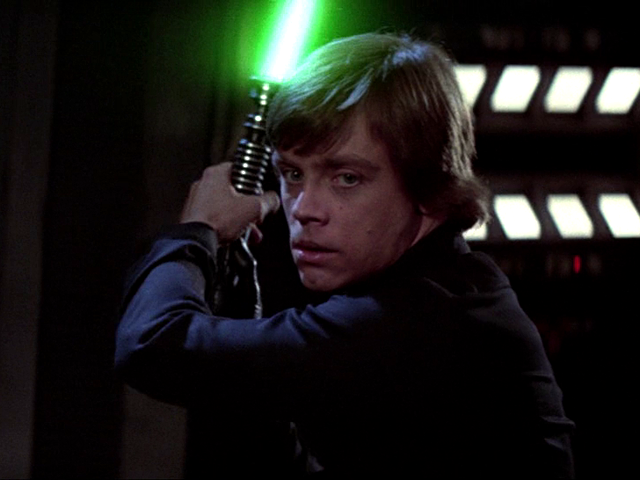I've always liked Luke Skywalker. Something about the character has always appealed to me: the guy who just goes and does the right thing because it's the right thing, consequences be damned. The story of the original trilogy was Luke fighting to keep that passion throughout all the changes that were thrust upon him: the death of his family, the loss of the Hoth base, finding out that not only was Darth Vader his father but that no one else thought he should be saved. Luke's arc was about someone refusing to lose their innocence to the overwhelming darkness that had claimed his father. a man whom he struggled to be like in spirit but not actuality.
And that's what I love about the Machete Order (Episodes 4, 5, 2, 3, and 6, the words Machete Order are actually a link): it deepens Luke's story. I watched this order with my wife Maria a few months ago (mostly against her wishes, Star Wars isn't her cup of tea). She watched it with me because I really wanted to try it and, while she had seen the original trilogy, she had never seen the prequels, so it made for some surprises for her. Episodes IV and V went about as expected: Maria tolerated them while I remembered what I loved about them in the first place: a simple tale about a boy who would be a hero.
Then we started on II and things changed. Gone was the optimism, the spark, the charm, and fight scenes that actually seemed like fight scenes. In its place was depression, despair, weakness, and a whole lot of flash with no substance. But somehow it worked, especially Episode III, which saw Anakin's true trouble: he had no moral compass. Anakin, while phenomenally powerful, had no way to figure out what the right thing to do was. His relationship with Obi-wan was wrecked and perverted. He hadn't gotten the guidance he needed to become a strong person. So when it all came down to that fateful scene with Mace Windu and Palpatine on Coruscant, Anakin goes with the guy who promises to help him protect those whom he loves. The fact that Anakin had no idea what he was going to do up until that point is what makes him such a flawed and tragic character.
 When Return of the Jedi came up the conflict became clear: Darth Vader was a hopeless, bumbling, incompetent, tragic man who had no moral character whatsoever. Anakin was no her until he saw Luke stand up to Palpatin. And that's when Star Wars finally crystallized for me.
When Return of the Jedi came up the conflict became clear: Darth Vader was a hopeless, bumbling, incompetent, tragic man who had no moral character whatsoever. Anakin was no her until he saw Luke stand up to Palpatin. And that's when Star Wars finally crystallized for me.I'd always felt that the trial of Luke during Return of the Jedi was odd, because Luke isn't the sort of guy who would just commit evil. That's not Luke's struggle, not really. No, what we were watching was Anakin finally being won over by his son, bit by bit. He put up a fight but Luke never gave up on Anakin, something that Anakin had never had before. The struggle became about Anakin's redemption. Luke's almost suicidal trust in his father had finally paid off. Luke had won and it was well worth the wait.
I don't know if George Lucas has seen anything about the Machete Order, but I'm completely sold: this is the definitive way to watch Star Wars. It improves the original trilogy by putting two of the prequels in as backstory, allowingr you to enjoy Return of the Jedi for the masterpiece that it was always intended to be. Luke was always meant to save Anakin, that was the point. And the Machete Order delivers this in the clearest way possible.

No comments:
Post a Comment